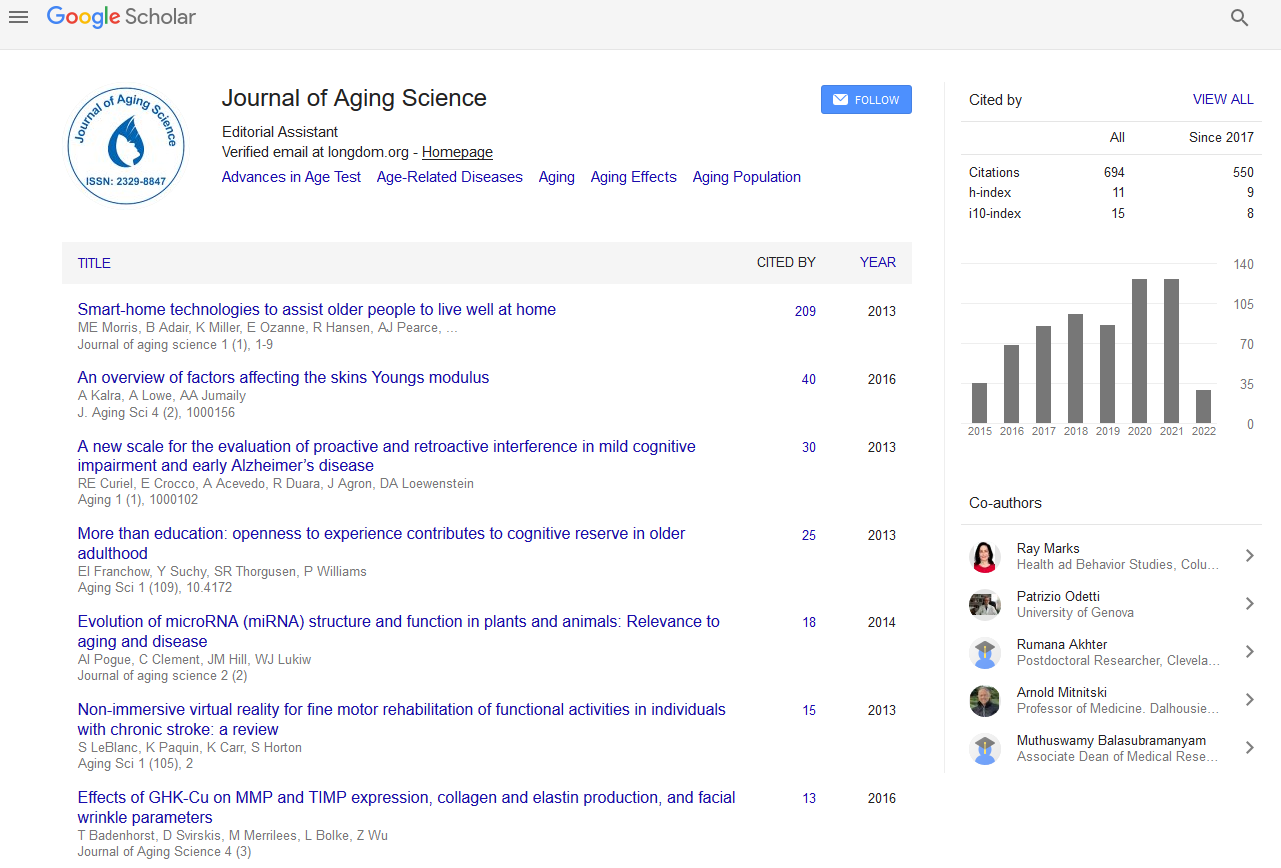PMC/PubMed Indexed Articles
Indexed In
- Open J Gate
- Academic Keys
- JournalTOCs
- ResearchBible
- RefSeek
- Hamdard University
- EBSCO A-Z
- OCLC- WorldCat
- Publons
- Geneva Foundation for Medical Education and Research
- Euro Pub
- Google Scholar
Useful Links
Share This Page
Journal Flyer

Open Access Journals
- Agri and Aquaculture
- Biochemistry
- Bioinformatics & Systems Biology
- Business & Management
- Chemistry
- Clinical Sciences
- Engineering
- Food & Nutrition
- General Science
- Genetics & Molecular Biology
- Immunology & Microbiology
- Medical Sciences
- Neuroscience & Psychology
- Nursing & Health Care
- Pharmaceutical Sciences
Abstract
Impact of Nutrition and Depression on the Cognitive Functioning of the Elderly in Taiwan
Cheng-Fen Chang and Tien-Ho Kuo
Background: According to the Alzheimer's Disease International (ADI), the regional distribution of new dementia cases worldwide in 2015 shows an increased proportion of new cases arising in Asia, the Americas and Africa. Moreover, an average of one new case of dementia every three seconds is estimated, with prevalence increasing with age. Nutritional disorder is a risk factor in reversible dementia, and literature also points out that the prevalence of depression in dementia patients is 22%, rendering depression a likely risk factor for future dementia. Therefore, this study mainly aimed to explore the relationship between nutrition and depression and cognitive function, and hopes that the findings can be used as a reference for providing medical care to the elderly.
Methods: This study used a cross-sectional survey to study the elderly in northern Taiwan. A total of 245 subjects were selected using convenience sampling, and a questionnaire survey was administered. The research tool was a structured questionnaire constructed by the researchers, and the results were analyzed using the SPSS 20.0 statistical software.
Results: A total of 245 elderly people over the age of 65 completed the questionnaire survey. According to the Pfeiffer's Short Portable Mental State Questionnaire (SPMSQ), 233 respondents (95.1%) showed normal cognitive functioning, and 12 respondents (4.9%) showed mild to serious cognitive impairment. The mean age of the subjects was 72.82 years old, with a standard deviation of ± 7.80. 92 (37.6%) of the subjects self-reported normal health condition; average total cognitive score was 9.13 (± 1.37); the average number of chronic diseases was 0.98 (± 1.04); the average nutritional score was 25.23 (± 3.71); and the average total depression score was 1.56 (± 0.65). Most of the respondents were women, had university education or above, were non-smokers, “thought about regularly exercising 3 times a week for 30 minutes each” and “agreed to regularly do trans theoretical exercises”. However, these variables were not significantly correlated to cognitive functioning. The relationship between age and cognitive functioning was also statistically insignificant. The number of chronic diseases showed significant negative correlation, indicating that subjects with more chronic diseases showed lower cognitive scores. Total cognitive score showed significant positive correlation to nutritional status, indicating that the better the nutritional condition of the elderly, the better their cognitive functioning. Total cognitive score negatively correlated to total depression score, indicating that those with higher depression score had poorer cognitive functioning.
Conclusion: This study showed that nutritional status, depression and chronic diseases were important variables that affect cognitive functioning. In order to improve the cognitive functioning of the elderly, the prevention of these key risk factors (nutritional status, depression, chronic diseases) can be strengthened to reduce rapid deterioration in cognitive functioning.


